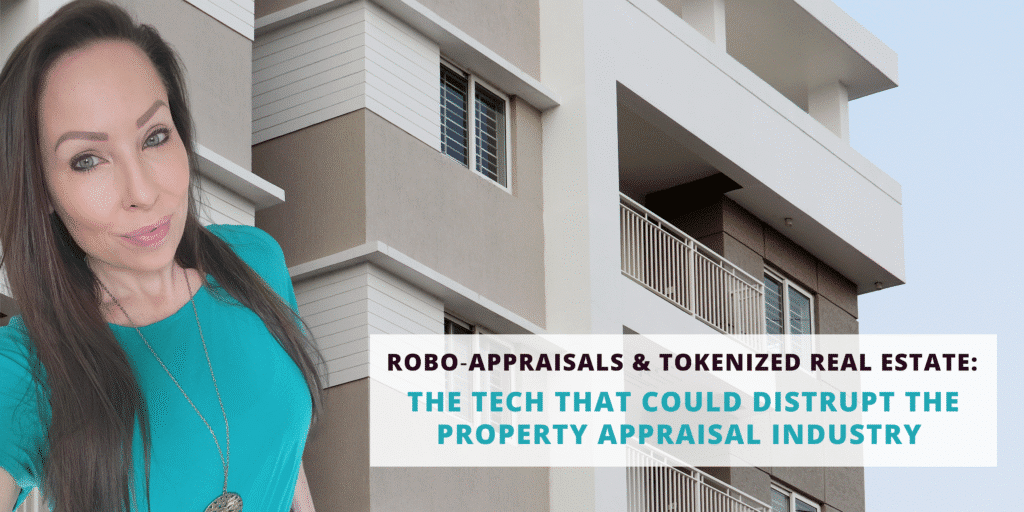
Evolving Technology Shaking Up The Real Estate World
When most people think of real estate appraisals, they imagine a clipboard-carrying human walking through a property, taking notes and comparing comps before issuing a carefully calculated value. But what if that role was automated? What if property ownership itself became digitized—bought and sold with a few clicks, like a stock?
Enter: robo-appraisals and tokenized real estate—two rapidly emerging technologies that are challenging the traditional valuation model and redefining how we buy, sell, and invest in property.
The Rise of Robo‑Appraisals
Robo-appraisals—also known as automated valuation models (AVMs)—are already here, and you’ve probably interacted with one. Zillow’s “Zestimate”? That’s an AVM. So are the property value estimates you find on REALTOR.ca or HouseSigma.
But this tech is now advancing at warp speed, leveraging machine learning, satellite imagery, property data, and buyer behavior analytics to create near-instant, algorithm-generated property valuations. Banks and institutional investors are already using them at scale to streamline mortgage approvals and portfolio evaluations.
In Canada, companies like Clear Capital, HouseCanary, and UrbanLogiq are making waves by delivering AI-powered AVMs with increasing precision. These models can evaluate thousands of data points in seconds, offering appraisals that are consistent, cost-effective, and fast.
So, what’s the disruption?
The shift away from human-led appraisals means:
- Faster financing approvals (days instead of weeks),
- Lower costs for lenders and buyers,
- And potentially less subjectivity and bias in the appraisal process.
But it’s not without concern. Critics argue robo-appraisals may miss unique property features, under- or overvalue homes in niche markets, or be vulnerable to data inaccuracies. A charming laneway suite or custom renovation might not be picked up by a data set—yet.
Still, as the tech improves, the question becomes not if but when AVMs will become the standard—especially for lower-risk residential lending.
Tokenized Real Estate: Breaking Down Ownership
Now layer in blockchain and tokenization, and you’ve got the makings of a real estate revolution.
Tokenized real estate is the process of dividing property ownership into digital tokens that can be bought and sold on blockchain platforms. Think of it as the fractional ownership of real estate—with the liquidity and transparency of stock trading.
One property could be broken into 1,000 tokens. You could own 5 tokens in a Toronto triplex, while someone else owns 100. Each token represents a share of the asset and entitles the holder to a portion of the rental income and appreciation.
Platforms like Addy, RealT, and Blocksquare are already bringing this model to life, with projects in North America, Europe, and Asia. In Canada, Addy has tokenized properties in B.C. and Ontario, allowing everyday Canadians to invest in real estate for as little as $1.
The valuation disruption?
Here’s where it gets interesting: tokenized real estate could lead to real-time property valuation based on the live trading price of each token. If a building’s tokens start trading higher, its market value increases—not because of a formal appraisal, but because of investor demand.
We’re already seeing this in practice with commercial tokenized assets. It creates a market-driven pricing mechanism, not unlike the stock market.
The Double Disruption
Now imagine combining robo-appraisals with tokenized real estate. You’ve got:
- Real-time pricing insights powered by blockchain activity.
- AVMs constantly recalibrating based on sales data, tenant turnover, repairs, and even weather conditions.
- A world where appraisals are continuous, dynamic, and democratized—not a one-time snapshot from a clipboard.
This fusion could make the traditional appraisal process feel outdated, slow, and overly manual. Lenders, insurers, and investors would have on-demand access to evolving property values based on both hard data and market sentiment.
What This Means for Investors & Realtors
For real estate investors, this opens up faster decision-making and access to more liquid investment options. You could buy a slice of a multi-family property in Pickering or Vancouver without ever stepping foot on the site.
For REALTORS®, it’s a wake-up call: if valuations become automated, we need to shift our value proposition toward strategy, negotiation, and insight. Understanding these tools—and how to explain them to clients—will be key.
Final Thoughts
We’re on the brink of a seismic shift. Robo-appraisals and tokenized real estate aren’t just buzzwords—they’re technologies with the potential to reshape how we value and trade property forever.
Yes, regulation, adoption, and skepticism still stand in the way. But the path is being paved. And those who understand these changes early will be the ones leading—not reacting—when the disruption hits full force.
Resources:
- https://addyinvest.ca – Canadian platform for tokenized real estate
- https://housecanary.com – AI-powered property analytics
- https://www.cnbc.com/2024/03/01/real-estate-tokenization-is-gaining-traction-in-north-america.html
And, if you’re thinking about buying, selling or investing in Durham Region or Toronto, let’s chat! I can be reached at 647-896.6584, by email at info@serenaholmesrealtor.com or by filling out this simple contact form. You can also kick off your search for Durham Region homes for sale by clicking here.
In addition, make sure we’re connected on social and you’ve subscribed to my YouTube Channel. And, for other articles specific to real estate investing, click here.










